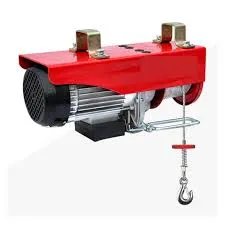


Understanding Crane Weight Scales A Focus on 5 Ton Models
In the construction and industrial sectors, efficiently managing loads is crucial for safety and productivity. One key aspect of this management is understanding the weight of materials being lifted. This is where crane weight scales come into play, especially the 5-ton models, which are among the most commonly used in various industries.
What Is a Crane Weight Scale?
A crane weight scale is a device that attaches to a crane to measure the weight of the load being lifted. These scales can provide instant feedback to operators, ensuring that they do not exceed the crane's lifting capacity. Various types of crane scales are available, including digital and mechanical options, with digital scales becoming increasingly popular due to their accuracy and ease of use.
Importance of Accurate Weighing
Properly weighing loads is not just a matter of efficiency—it is a matter of safety. Overloading a crane can lead to serious accidents, damaging property and endangering lives. A weight scale allows operators to ensure that they are within safe lifting limits and adhere to regulatory standards. For instance, a 5-ton scale is ideal for many small to medium-sized projects where loads can fluctuate around this weight.
Features of 5 Ton Crane Weight Scales
1. Capacity As the name suggests, these scales can handle loads weighing up to 5 tons. This makes them suitable for a wide range of applications, including warehouses, construction sites, and manufacturing facilities.
2. Portability Many 5-ton crane weight scales are designed to be lightweight and portable. This allows them to be easily moved from one location to another, maximizing their utility in various job sites.
3. Digital Display Most modern 5-ton scales feature a digital display that provides clear readouts of the weight being lifted. This feature minimizes the chances of human error associated with manual readings and allows for better monitoring at a distance.

4. Durability Designed for industrial use, these scales are built to withstand harsh conditions. Whether it's exposure to dust, moisture, or varying temperatures, a reliable 5-ton crane weight scale can continue operating effectively.
5. Wireless Capability Some high-end models come with wireless capabilities that allow operators to monitor load weights remotely. This is particularly useful in large work environments where direct visibility may be limited.
Applications of 5 Ton Crane Weight Scales
5-ton crane weight scales are versatile and find applications in various industries
- Construction In construction sites, accurate weight measurement ensures that heavy materials such as steel beams and concrete blocks can be lifted without exceeding crane limits.
- Manufacturing Within factories, these scales can help manage the movement of raw materials and finished products, ensuring that handling processes run smoothly and efficiently.
- Shipping and Logistics In shipping yards and warehouses, 5-ton scales are often used to confirm the weight of loads before they are transported, helping to optimize shipping costs and ensuring compliance with transport regulations.
Conclusion
In summary, crane weight scales, particularly those with a 5-ton capacity, are essential tools in various industries. They play a significant role in ensuring safety, enhancing efficiency, and aiding in proper load management. As technology advances, we can expect future models to offer even more features, such as advanced analytics and integrated safety systems. For anyone involved in lifting and handling heavy loads, investing in a reliable crane weight scale is not just advantageous—it's a necessity. Understanding the capabilities and applications of these scales can contribute significantly to safer and more efficient operations in any work environment.



